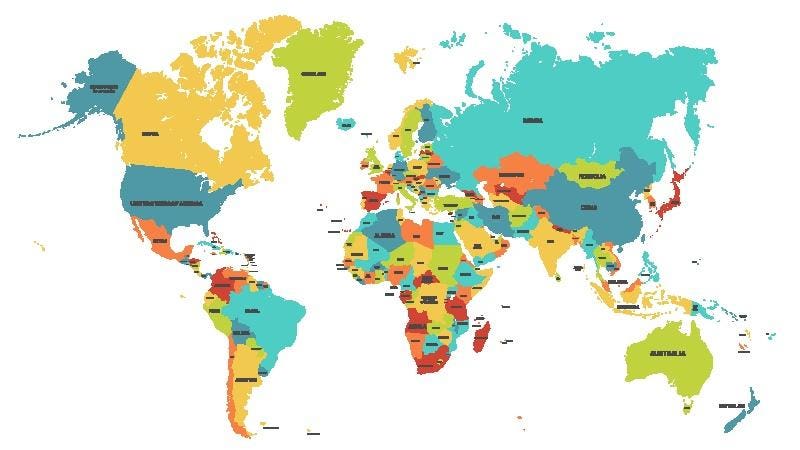The global AI superpowers aren’t necessarily who you’d think they’d be.
getty
While China leads the world with 230 AI clusters, the United States leads with 50% of global compute power for AI, according to a new report on global AI superpowers by TRG Datacenters. In second and third place for AI compute, perhaps less obvious candidates: the United Arab Emirates and Saudi Arabia. Traditional industrial powerhouse Germany ranks only 10th for AI compute capacity.
“The U.S. keeps the title of the most AI-dominant country in 2025, outperforming every other nation with the AI compute power and the highest total power capacity at 19.8K megawatts,” a representative told me via email. “When it comes to AI chips, France takes second place with over 989K, getting ahead of China, India, and South Korea.”
The top 10 AI nations on the planet have a collective 496 AI clusters with a combined compute capacity equivalent to about 79 million NVIDIA H100 chips, according to the report, which is based on the Epoch AI dataset, one of the most detailed sources on global AI infrastructure.
By total compute power, here are the top 10 nations:
- USA: 39.7 million H100 equivalents
- UAE: 23.1 million
- Saudi Arabia: 7.2 million
- Korea: 5.1 million
- France: 2.4 million
- India: 1.2 million
- China: 400,000
- UK: 120,000
- Finland: 72.000
- Germany: 51,000
Global AI superpowers ranked by amount of AI compute capacity
John Koetsier
Since each H100 delivers around 1,000 teraflops (1 petaflop) of compute, this combined fleet of AI machines theoretically offers 79 million petaflops or 79 exaflops: 70 times the compute capacity of the world’s top supercomputer, Frontier at the Oak Ridge Leadership Computing Facility. If used at full capacity, this global fleet powering the AI revolution would consume about 55 gigawatts of electricity: roughly the entire power demand of California on a hot summer day.
That’s roughly equivalent to the power demands of France or Germany, or of the UK and Spain put together.
The story is very different from the perspective of AI datacenter clusters. Here China leads, the U.S. is second, and every other country trails far in the distance.
- China: 230 clusters
- USA: 187 clusters
- France: 18 clusters
- Korea: 13 clusters
- Germany: 12 clusters
- Saudi Arabia: 9 clusters
- UAE: 8 clusters
- India: 8 clusters
- UK: 6 clusters
- Finland: 5 clusters
Global AI data center clusters by country of residence
John Koetsier
While China looks like a surprise laggard in overall compute power – thanks in no small part to U.S. trade restrictions – its huge number of AI compute facilities tells a different story. There’s definitely a power challenge: despite having the most clusters in the world with about 629,000 chips, China’s compute power translates to just 400,000 H100 equivalents, only good for seventh overall globally. That significantly constrains the nation’s AI muscle.
But in a very Sun Tzu Art of War way, that weakness could be a hidden strength.
China’s infrastructure profile could help explain approaches like DeepSeek’s efficiency-first LLM design. Because compute is constrained relative to the U.S. or UAE, Chinese AI labs tend to optimize training techniques and push algorithmic efficiency. The result is a focus on inference cost reduction that delivers nearly-as-good results for much less computational cost.
““The battle for AI supremacy is being fought on multiple fronts, and raw computing power is just one piece of a much larger puzzle,” a representative from TRG Datacenters, which made the report, said via email.
The United Arab Emirates and Saudi Arabia are perhaps unlikely AI superpowers, but are clearly investing oil wealth into what they likely perceive as the wealth-building technology of the future: artificial intelligence. Traditional European powerhouses Germany, UK, and France are far behind.
Power, chips, and compute centers are only a piece of the AI superpower puzzle, of course. To achieve excellence in AI, nations need the compute, but also chip production, AI talent, workforce and corporate adoption, benevolent government regulation, and a thriving ecosystem of AI startups.
But if only a few nations achieve a measure of global AI supremacy, that could have far-reaching impacts on competitiveness, economic and financial power concentration, control over key technologies for modern life, and outsized social and cultural influence.
AI investment surged to a record $200 billion this year, the report says, suggesting that the battle for AI supremacy is heating up.
For now, the U.S. remains in the lead, but the global map of AI superpowers is shifting in surprising ways.









